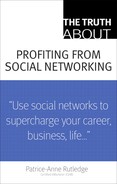Facebook (www.facebook.com) has been undergoing a facelift, but instead of trying to look younger, it’s focusing on a more mature image.
Facebook launched in February 2004 as a social networking site for students at Harvard. It quickly expanded to include students at other top-tier universities: Columbia, Stanford, and Yale. By the end of its first year, Facebook had nearly one million active members. The decision in September 2006 to expand from a network of students to a network that anyone, anywhere could join propelled its growth even further.
Significant venture capital funding has been integral to Facebook’s expansion and success, enabling it to introduce a rapid succession of site enhancements. These enhancements include Marketplace classified ads, Facebook polls, mobile access, a multitude of third-party applications, and high-profile partnerships with Amazon.com, Forbes, Microsoft, Virgin Mobile USA, and Warner Bros. Records. Facebook membership more than quadrupled in less than a year, growing from 12 million users in December 2006 to 53 million active users in November 2007. This extremely rapid growth is one of the things that makes Facebook’s story unique among the vast majority of competing social networking sites.
Although it’s clear that Facebook has transitioned from its student origins to a mainstream social networking site, it still displays some of its youthfulness with features not found on more business-oriented sites (pokes, hugs, or flowers, anyone?). Regardless, business users have found a home on Facebook, for example, through the successful use of targeted profiles and groups. Facebook itself is courting the business market with its series of Business Solutions (www.facebook.com/business).
The launch of the Facebook Ads program in November 2007 was yet an additional step in solidifying Facebook’s place as a mainstream social network. Businesses seeking to tap into Facebook’s large audience can now establish strategic advertising and marketing campaigns on the site. There are three elements to Facebook Ads:
Facebook Pages—. Facebook Pages enable businesses to develop a free Facebook presence beyond a traditional profile. Businesses, organizations, musicians, authors, and artists can use Pages to communicate with “fans” and develop a fanbase on Facebook. Pages provide special features based on the type of business you have. For example, a singer can easily post song clips, video clips, and more.
Facebook Beacon—. This feature enables users to share content from participating websites via news feeds in Facebook. For example, eBay allows its sellers to include information about their current eBay listings in Facebook, increasing exposure and potential sales. Although there are benefits to Beacon, its original format had the potential to expose users’ private data without their knowledge. As a result, privacy rights activists voiced their concerns loudly when Beacon was first introduced. One month later, Facebook’s CEO issued an apology and announced that users could opt out of Beacon.
Social Ads—. Social Ads enable businesses to advertise to targeted Facebook users based in part on the actions of their friends. You can target by age, gender, location, or interests and purchase ads by either clicks or impressions. Social Ads debuted with several big-name companies as its first participants, including Blockbuster, CBS, Chase, The Coca-Cola Company, Sony Pictures, and Verizon. A complementary program, Facebook Insight, provides valuable metrics on ad performance, demographics, and trends.
Businesses and software developers are also benefiting from new Facebook features such as Facebook Platform. With Platform, you create your own application that Facebook users can implement on their profiles, increasing your visibility on the site. To encourage the development of new applications, Facebook offers a special site (http://developers.facebook.com) with detailed information on how to create and implement a Facebook app.
With its rapid growth, recent reinvention, and frequent new developments, Facebook has generated a lot of media attention. The good news for marketers, advertisers, and developers is that there is abundant opportunity to tap into Facebook’s vast and growing audience.
